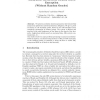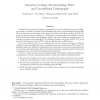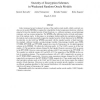199 search results - page 6 / 40 » Adaptive Proofs of Knowledge in the Random Oracle Model |
106
click to vote
ASIACRYPT
2009
Springer
15 years 7 months ago
2009
Springer
Adaptive oblivious transfer (adaptive OT) schemes have wide applications such as oblivious database searches, secure multiparty computation and etc. It is a two-party protocol whic...
107
click to vote
CRYPTO
2006
Springer
15 years 4 months ago
2006
Springer
We present an identity-based cryptosystem that features fully anonymous ciphertexts and hierarchical key delegation. We give a proof of security in the standard model, based on the...
108
click to vote
CRYPTO
2010
Springer
15 years 2 months ago
2010
Springer
Motivated by the question of basing cryptographic protocols on stateless tamper-proof hardware tokens, we revisit the question of unconditional two-prover zero-knowledge proofs fo...
110
click to vote
PKC
2010
Springer
15 years 5 months ago
2010
Springer
Liskov proposed several weakened versions of the random oracle model, called weakened random oracle models (WROMs), to capture the vulnerability of ideal compression functions, wh...
109
click to vote
CRYPTO
2004
Springer
15 years 6 months ago
2004
Springer
We construct two efficient Identity Based Encryption (IBE) systems that are selective identity secure without the random oracle model. Selective identity secure IBE is a slightly w...



